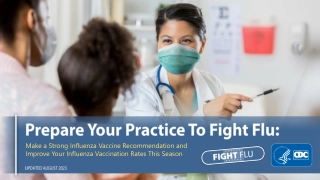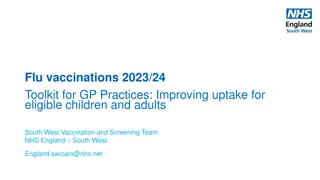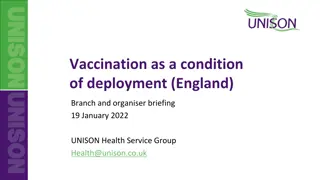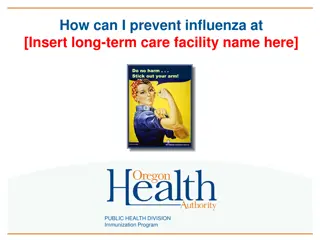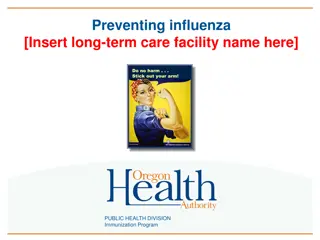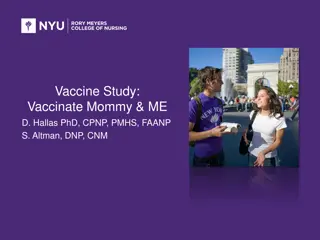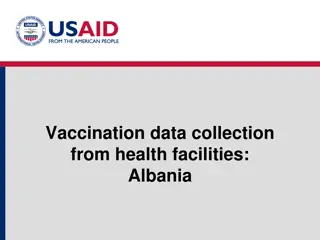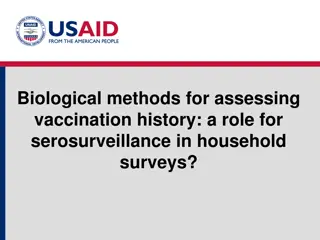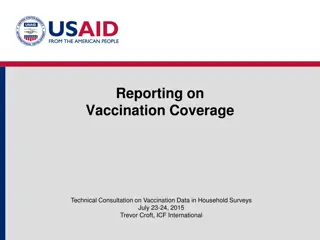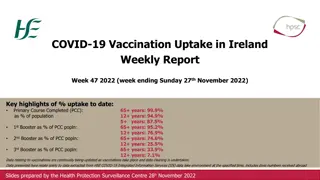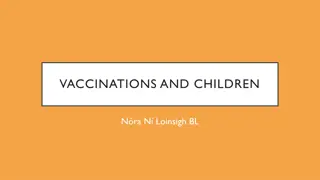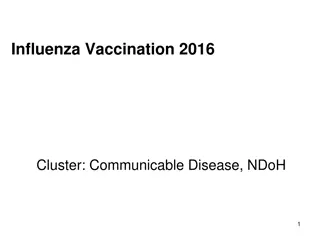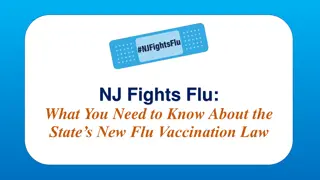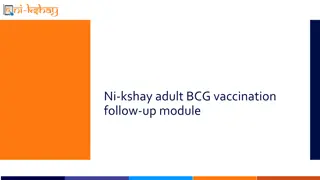Importance of Flu Vaccination for Vulnerable Individuals
The presentation highlights the significance of getting a flu jab, especially for high-risk groups such as older individuals and pregnant women, emphasizing the associated severe illness and potential complications like pneumonia. It also discusses symptoms, differences from a cold, and the role of community pharmacies in providing flu vaccinations.
Download Presentation

Please find below an Image/Link to download the presentation.
The content on the website is provided AS IS for your information and personal use only. It may not be sold, licensed, or shared on other websites without obtaining consent from the author.If you encounter any issues during the download, it is possible that the publisher has removed the file from their server.
You are allowed to download the files provided on this website for personal or commercial use, subject to the condition that they are used lawfully. All files are the property of their respective owners.
The content on the website is provided AS IS for your information and personal use only. It may not be sold, licensed, or shared on other websites without obtaining consent from the author.
E N D
Presentation Transcript
Read and delete this slide Questions or comments on this presentation can be addressed to Services.Team@psnc.org.uk You can pick and choose the elements of the presentation that suit the needs of your event Last updated: 3rd September 2019
The importance of having a flu jab
Introduction National NHS flu immunisation programme Free NHS flu jab for certain individuals who are more at risk of developing severe illness or the complications of flu Runs from September to March each year Important to have a flu jab if you re eligible widely available from community pharmacies or your GP practice
Introduction Flu is an unpredictable virus; can cause severe illness or death among vulnerable groups including older people, pregnant women and people with an underlying health condition Can also cause potentially serious complications such as bronchitis or pneumonia
What are the symptoms of flu?
Symptoms of flu Sudden fever (temp of 28C or above) Dry, chesty cough Headache Tiredness & weakness Chills Aching muscles Limb or joint pain
Symptoms of flu Diarrhoea or abdominal (tummy) pain Nausea and vomiting Sore throat Runny or blocked nose Sneezing Loss of appetite Difficulty sleeping
Is it flu or a cold? The main differences are: Flu symptoms Cold symptoms Come on quickly Come on gradually Usually includes fever and aching muscles Mainly affects your nose and throat Make you feel too unwell to continue your usual activities Are fairly mild, so you can still get around and are usually well enough to go to work
Community pharmacy flu service Pharmacists have been administering flu jabs for a number of years private services and through locally commissioned services NHS England recognised the value of including community pharmacists in the national flu immunisation programme and all community pharmacies are now offered the opportunity to offer this service
To be able to offer the community pharmacy flu service Pharmacies have to have a consultation room which meets certain requirements Pharmacists have to undergo training which includes face-to-face training on injection technique and basic life support
Who can have a flu jab in a community pharmacy? People aged 65 years and over (including those becoming age 65 years by 31 March 2020) Pregnant women aged 18 years or over Carers aged 18 years or over Household contacts aged 18 years or over of immunocompromised individuals People living in long-stay residential care homes or other long-stay care facilities Social care workers and hospice workers
At-risk groups People aged from 18 to less than 65 years of age in an at-risk group Chronic respiratory disease such as asthma or COPD Chronic heart disease such as heart failure Chronic kidney disease at stage 3, 4 or 5 Chronic liver disease
At-risk groups Chronic neurological disease such as Parkinson s disease, motor neurone disease or learning difficulty Diabetes Weakened immune system due to disease such as HIV/AIDS or treatment such as cancer treatment Asplenia or splenic dysfunction Morbid obesity
Those not eligible for a flu jab in a community pharmacy Currently, pharmacists cannot administer flu jabs to those under 18 years of age, these patients should speak to their GP practice If patients are not eligible for a free NHS flu jab then many pharmacies also offer a private flu service where the patient can pay for a vaccination
Notifying your GP Pharmacists have to send a notification to GP practices of patients who have been vaccinated in the pharmacy so medical records can be updated This is sent on the same day as vaccination or on the following working day
Advantages to having a flu jab in your community pharmacy Often no appointment is needed, you can just turn up when it s convenient for you Pharmacies are often open for longer hours than GP surgeries making it easier to visit Pharmacies are often open on weekends which may make them more convenient to visit
Flu myth Having flu is just like having a bad cold. This is incorrect. Flu is much worse than a bad cold, you re likely to spend two to three days in bed with flu
Flu myth Having the flu jab gives you flu. This is incorrect. The injected flu vaccine that is given to adults contains inactivated flu viruses, so it cannot give you flu. Your arm may feel a bit sore where you were injected, and some people may get a slight temperature and aching muscles for a couple of days afterwards.
Flu myth Once you ve had the flu jab, you re protected for life. This is incorrect. The viruses that can cause flu change every year, so you need a flu jab each year that matches the new viruses.
Flu myth I ve not had my flu jab so it s too late for this year. This is incorrect. It is better to have the flu vaccine as soon as it becomes available, usually in September/October, but it s always worth getting vaccinated before flu comes around right up until March.


